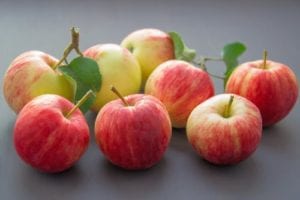Written by Jessica Patella, ND. Compared to placebo, twelve weeks of supplementation with an apple polyphenol reduced ultraviolet irradiation induced skin pigmentation in healthy women.
 The skin is not only the largest organ of the human body, but it also safe guards the body against pathogens, ultraviolet radiation, changes in temperature and fluid loss 1,2. It is proposed that supplementing with polyphenols can improve skin conditions 1,3. Polyphenols are commonly found in fruits, vegetables, nuts, seeds, red wine and cocoa 1,4. Yet, very few human studies have evaluated the effects of apple polyphenol supplementation on facial skin, until now 1.
The skin is not only the largest organ of the human body, but it also safe guards the body against pathogens, ultraviolet radiation, changes in temperature and fluid loss 1,2. It is proposed that supplementing with polyphenols can improve skin conditions 1,3. Polyphenols are commonly found in fruits, vegetables, nuts, seeds, red wine and cocoa 1,4. Yet, very few human studies have evaluated the effects of apple polyphenol supplementation on facial skin, until now 1.
When the skin becomes damaged it can result in water loss, decrease in moisture content, increase in pigmentation, cancer and photoaging of the skin 1. UV radiation and free radicals can also damage the skin by breaking down collagen fibers 1. Since polyphenols have been shown to effect mouse melanoma cells 5, apple polyphenols were used to determine if they had any effect on human skin 1.
The research included 65 healthy women (20-39 years of age) that were randomly assigned to either the low-dose or high-dose apple polyphenol group (300 or 600 mg/day) or a placebo group for 12-weeks. Women’s skin was evaluated as follows: at baseline the upper arm was exposed to UV light (6th position, Xenon Arc Solar Simulator), 16-24 hours later, skin color was evaluated. Then after 2 weeks of supplementation, skin color lightness (L-value) and pigmentation (melanin value) were measured (via spectrophotometer). Then the upper arm was exposed to UV light again (1.5 MED) and skin color lightness and melanin value were measured at 1, 2, 3, 4, 6, and 10 weeks after UV exposure 1. To evaluate skin conditions, water content and trans-epidermal water loss (TEWL) at the corner of the eye was measured (via Skicon-200 EX).
There results after 12 weeks were as follows:
- Those in the apple polyphenol group had less UV light damage:
- Less erythema (redness, erythema value) compared to baseline
- Less pigmentation (melanin value) compared to baseline
- Increased Skin lightness (L-value) compared to baseline
- Although there were not dose-dependent differences observed and no statistically significant difference was observed compared to the placebo group.
- No differences were observed in water content or trans-epidermal water loss.
In conclusion, these results indicate apple polyphenol may protect from pigmentation induced damage from UV irradiation. This is the first study to evaluate apple polyphenol in humans and further studies with a greater population size need to confirm results. It is also important to note that two of the authors of the research study are employed by the company that provided the apple polyphenol supplement for this study 1.
Source: Shoji, Toshihiko, Saeko Masumoto, Nina Moriichi, Yasuyuki Ohtake, and Tomomasa Kanda. “Administration of Apple Polyphenol Supplements for Skin Conditions in Healthy Women: A Randomized, Double-Blind, Placebo-Controlled Clinical Trial.” Nutrients 12, no. 4 (2020): 1071.
© 2020 by the authors. Licensee MDPI, Basel, Switzerland. This article is an open access article distributed under the terms and conditions of the Creative Commons Attribution (CC BY) license (http://creativecommons.org/licenses/by/4.0/).
Click here to read the full text study.
Posted May 18, 2020.
References:
- Shoji T, Masumoto S, Moriichi N, Ohtake Y, Kanda T. Administration of Apple Polyphenol Supplements for Skin Conditions in Healthy Women: A Randomized, Double-Blind, Placebo-Controlled Clinical Trial. 2020;12(4).
- Pérez-Sánchez A, Barrajón-Catalán E, Herranz-López M, Micol V. Nutraceuticals for Skin Care: A Comprehensive Review of Human Clinical Studies. 2018;10(4).
- Nichols JA, Katiyar SK. Skin photoprotection by natural polyphenols: anti-inflammatory, antioxidant and DNA repair mechanisms. Arch Dermatol Res. 2010;302(2):71-83.
- Gu L, Kelm MA, Hammerstone JF, et al. Concentrations of proanthocyanidins in common foods and estimations of normal consumption. J Nutr. 2004;134(3):613-617.
- Shoji T, Masumoto S, Moriichi N, et al. Procyanidin trimers to pentamers fractionated from apple inhibit melanogenesis in B16 mouse melanoma cells. J Agric Food Chem. 2005;53(15):6105-6111.

